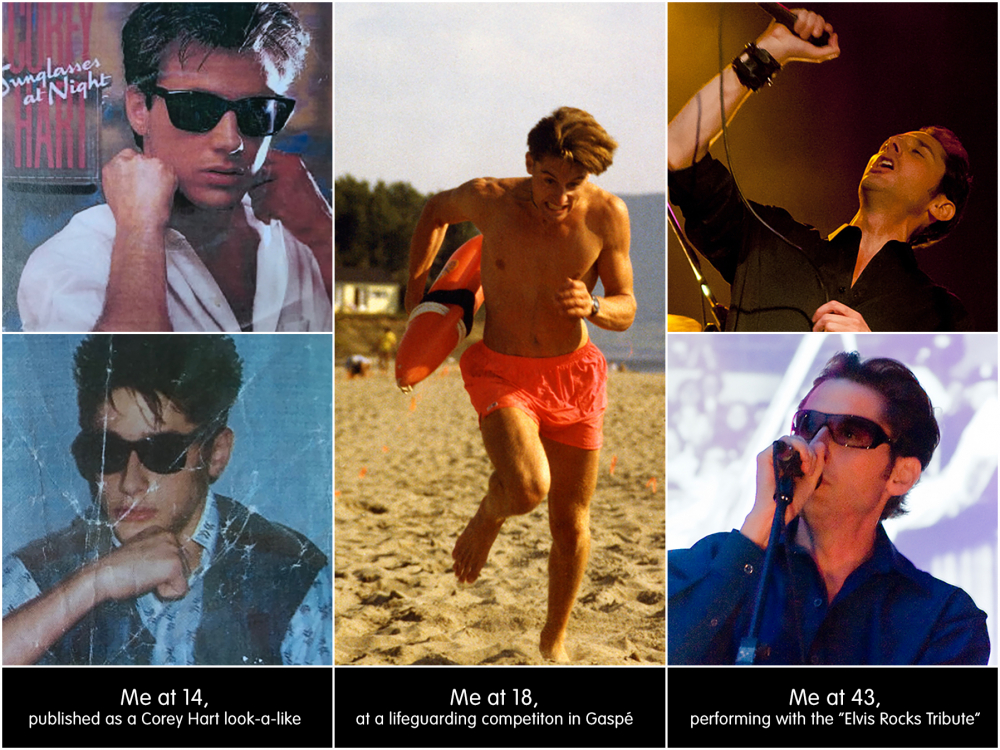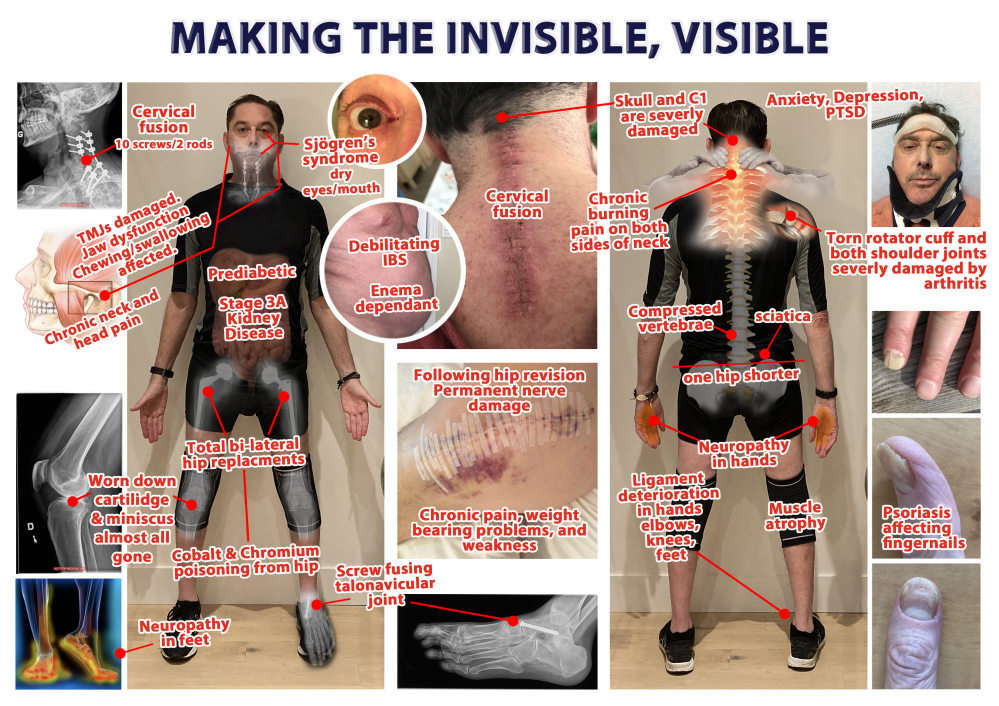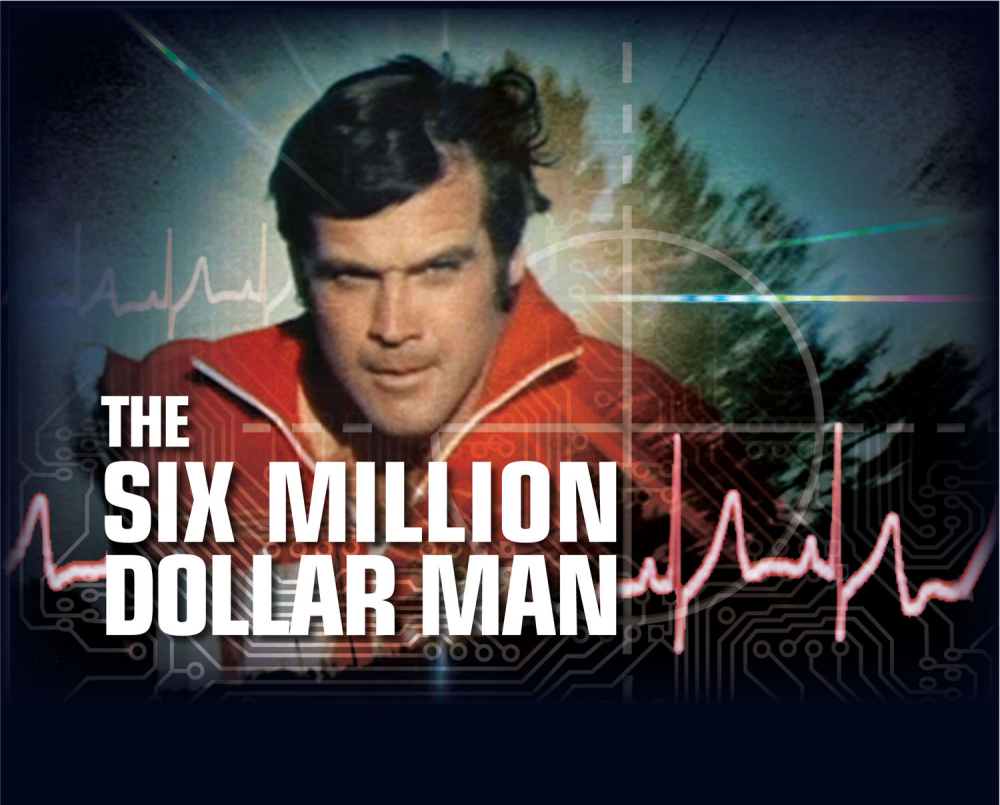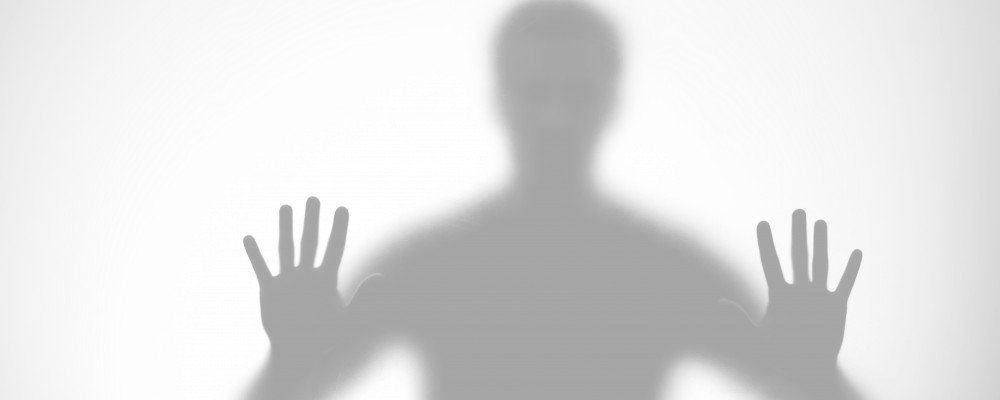
If you saw me walking along the sidewalk, perhaps into a store or restaurant, or even getting in and out of my car, you would likely not think twice or consider that there may be anything wrong with me...
...I would be another passer-by, a stranger going about his day, as you would be, with nothing visually apparent about me that would indicate that I may not be well. Other than a few signs indicating that I have reached middle age and some hollow dark circles under my eyes, I look pretty good for a 53-year-old man. I'm often told that I "look good" or "look young," and people are often quite surprised to hear that I have a 24-year-old son! I'm 5'10", I have not gone gray, I still have most of my hair, and I usually smile whenever I meet people. I look healthy enough. I seem like I could get up in the morning, hold down a job, take care of my kids, maybe play a few sports, manage the responsibilities of owning a home and caring for the property; you know, the kind of stuff that most people can do.
If I was a used car sitting on a car lot, I could imagine someone looking at me and saying, "Hey! This one looks pretty good; what do you say we take it for a test drive!" But as we all know, "appearances can be deceiving." So don't let that shiny coat of paint fool you. Before you put the key in the ignition, let's peek under the hood, shall we? Below is My Story.
Living with visible and invisible diseases
It’s been 32 years since I was first diagnosed with an incurable, degenerative, chronic autoimmune disease - Psoriatic Arthritis. A lot has happened in those 30 years. Ironically, my story began as a child with a visible illness, Psoriasis, which first appeared on my scalp. I still remember asking the doctor, “Is there a cure?” and sinking in my chair when he answered, “No.” It eventually spread to other parts of my body and became quite a problem. I spent all my teenage and early adulthood years doing my best to hide my visible disease. As you can imagine, going through the “teen” years with a visible disease that can be quite disfiguring was very hard. Kids can be cruel, as we all know, so trying to keep my Psoriasis from being noticed was a daily challenge. When most of your scalp is covered in scales and flaking onto your shoulders, you become very self-conscious and hyper-aware of who’s around and who’s looking at you. And, because Psoriasis is, let's face it, ugly to look at, people tend to think it might be something contagious. So, you come up with creative ways to get by without being noticed, and when you do get noticed, you do your best to circumvent people’s comments rather than admit to having Psoriasis. It reshapes your entire life and makes things like having a girlfriend much more challenging, if not impossible.

Interestingly, I still managed to pursue my passion for swimming and eventually became a lifeguard! Despite having these scaly red patches on my body, I still showed up in my Speedo for swimming lessons and lifeguard training. But, I should add that I (and my sister, God bless her) spent countless hours applying salves and tar-based lotions to my patches and used special shampoos to control the disease. I also went to the sun tanning parlour once a week during the winter months, which helped keep the Psoriasis at bay. (The sun’s ultraviolet rays are made up of UVA and UVB rays. UVB rays are more effective at treating Psoriasis symptoms because they slow the rapid rate of skin growth and shedding.)
In early spring, I would spend hours lying in the sun in my backyard, shivering in my Speedo as I soaked in the sun’s rays to be “ready” for the summer swimming/lifeguarding season with as few noticeable patches as possible.
To summarize, your life revolves around your condition. Back in the ’80s, people kept things hidden. Only recently have we seen an emergence of people like Cyndi Lauper, who recently shared her struggle of living in the limelight with Psoriasis and has endorsed Cosentyx®, a biologic drug that is used to treat Psoriasis, Psoriatic Arthritis, and Ankylosing Spondylitis. But back in the day, no one talked about it. Oddly, I only learned after my diagnosis of Psoriatic Arthritis that Psoriasis is an autoimmune disease. Throughout all the years prior, no doctor had ever mentioned that to me.
This was me before illness took over.

Many of you who know me already know that I have been living with Psoriatic Arthritis for many years, since the age of 22. Although I appear to be relatively healthy and normal when you see me in person, I'm actually quite ill. Since that diagnosis, my list of illnesses, disorders, and comorbidities has grown to over a dozen, with the top three being Psoriatic Arthritis, Ankylosing Spondylitis, and Sjôgren's Syndrome. I've also undergone several surgeries: I have bilateral hip replacements, fused cervical vertebrae, and a fused joint in my left foot. After almost 30 years of living with these diseases, I have become compromised and partially disabled.
For my complete list of illnesses and surgeries, please go to my ILLNESSES page.
Some of you know much more about what I’ve been through than others. But even for those who know me well and know my story, there is still so much misunderstanding surrounding arthritis. So, I decided it was time for me to share with those closest to me and the rest of the world what it’s like to live with a debilitating, degenerative, invisible, chronic disease. Did you know that there are more than 100 different forms of arthritis and related diseases? The word “arthritis” is an umbrella term for a large family of rare and common diseases that fall under this category: arthritis. One word to cover 100 different types isn’t necessarily a good thing. It makes it much harder for people to understand the difference between, say, arthritis symptoms that manifest due to old age versus living with a chronic, degenerative autoimmune disorder such as Psoriatic Arthritis and Ankylosing Spondylitis or Rheumatoid Arthritis. The five most common types of arthritis are Osteoarthritis, Rheumatoid, Psoriatic, Gout, and Lupus. Unfortunately, thanks to the marketing targeted around the trillion-dollar “pain relief” industry (Advil, Tylenol, etc.), the public at large has associated the word “arthritis” with the kind of pain that an athlete or physically active person might experience through normal activity. These milder forms of arthritis, the ones that come from aging and the normal wear and tear on the joints, can be relieved with over-the-counter drugs. However, the autoimmune types of arthritis are far more severe; these are serious conditions that can affect more than just the joints. They also attack tendons, ligaments, muscles, organs, and the metabolic system. Psoriatic arthritis comes with quite a long list of comorbidities.
Hip replacement and surgeries
At age 27, I had my left hip replaced, and at age 31, I had my right hip replaced. In 2006 I had a screw put in my left foot to fuse a damaged Talonavicular joint, and more recently, in 2016, my left hip was revised because the 17-year-old implant had worn out. Sadly, it was not a 100% successful surgery, and I have been left with permanent sequela, i.e., stiffness, pain, nerve damage, and bouts of acute sudden pain that shoots down through the femur depending on the rotation of the hip. I met with an amazing orthopedic surgeon in New Jersey in 2015 who gave me his opinion as to why I was still having pain. According to him, a critical piece of bone was missing on which the weight was supposed to be distributed. When I asked what could be done to correct the problem, he said, “Another hip revision.” However, with everything I’ve been through, the idea of having the hip revised again is not something I really want to consider!
Cobalt and Chromium poisoning
About 10 years ago, it was discovered through a specialized blood test that my metal-on-metal hip implant (the RIGHT hip) was leaching toxic levels of Cobalt and Chromium into my body. It was the latest and greatest model at the time of my surgery and was designed to last my whole life. Since then, I have been monitored every 3 months to see where the levels are at. They fluctuate all the time, and this is normal. However, my test from August 2021 revealed that the Cobalt, in particular, was excessively high. My result was 100 nMol/L, and the reference range for normal is between 2.6 - 6.8! I recently had it tested again, and the result was 81, which is still very high.
In April of 2022, after consulting with a new orthopedic surgeon in Montreal who saw blood test results showing extremely high levels of Cobalt and Chromium that are leaching and literally poisoning me, I was told that it is likely that I will have to have that hip revised as well. I'm meeting with the surgeon again in August to discuss my options. In conjunction with the doctors in Georgia, I have sent out a hair biopsy sample to a lab that will determine how much of these metals my body is storing, which is different from the amounts flowing in the blood.
(UPDATE: In January of 2023, I had the leaching hip implant revised. Since then, my blood tests have revealed normal numbers of Cobalt and Chromium. I was hoping that some of the symptoms listed below might be alleviated, but no such luck)
COBALT POISONING SYMPTOMS (I suffer from the ones with arrows at the end of each line)
- Basal septal hypertrophy (BSH) - an asymmetric, localized thickening of the upper interventricular septum <—
- Depression and other mental health conditions <—
- Visual impairment that may lead to blindness
- Cognitive impairment Nerve problems (peripheral neuropathy) <—
- Gastrointestinal Problems <—
- Thyroid problems <—
- Tinnitus <—
- Skin rashes
- Anxiety <—
- Auditory impairment that may lead to deafness <—
- Heart irregularities <—
- Irritability <—
- Poor memory and mental fogginess <—
- Shortness of breath <—
- Vertigo <—
- Tremors <—
- Noise coming from the hip <—
- Infection
- Implant loosening
You can learn more about this by going to my ILLNESSES page and clicking "Cobalt and Chromium poisoning from a leaching metal-on-metal hip" under the "UROLOGICAL AND NEUROLOGICAL CONDITIONS" section.
There are several class-action lawsuits in the U.S. against the manufacturers of these implants that leach. I found a law firm here in Montreal that wants to take my case as an independent plaintiff. We are currently building the case against the manufacturer. I will update this page and post a dedicated chapter once things develop.
(UPDATE: I could not file a lawsuit because too many years had elapsed. So the whole lawsuit idea has been dropped)
And, this is me today.
The Bionic Man

A few years ago, after reviewing my latest blood work, my Endocrinologist/Integrated Medicine doctor, whom I really liked, looked at me and said, "Patrick, you are officially my sickest patient." I can't tell you how hard it was to hear that. I could not believe my ears. I was the sickest he'd seen out of hundreds of patients! Upon reviewing my blood test results, from which he concluded that I was also now suffering from Polyglandular Syndrome, he said, "Your body is giving up." Imagine hearing that? And, upon visiting an acupuncturist (an ex-oncologist doctor) in Hoboken, N.J., for treatment, I was also told essentially the same thing, i.e., "You are the most complicated case I have ever had." My endocrinologist actually said, upon my 1st and 2nd visits, that he was taking me on as a "personal challenge." He knew that my case was very complicated and hard to manage and treat, but he committed himself to doing his best to improve my health and quality of life nonetheless. His comments indeed confirmed what I had been saying to doctors and people everywhere for the past 2 to 3 years, "I'm really sick, and no one seems to know how to help me."
(UPDATE: I've since switched endocrinologists, and I am much happier with him. He was able to get me to titrate my cortisone intake significantly, something that was causing other health problems.)
Imagine that for a moment. He has patients with cancer and other serious life-threatening conditions, yet I get 1st prize for being "the sickest" just due to the sheer number of compounding health issues I have to contend with. This "sickest patient" comment hit me like a freight train. I came home and was decidedly ready to start trying to turn this ship around - slowly but surely. However, try as I might, I have not been able to slow down the progression of any of these health issues, which has been so discouraging. As a result, the idea to create BeingInvisible.ca, which I had been mulling over for two years, was suddenly front and center in my mind and had become a priority!
I'm at a juncture in my life now. I have to accept what has happened to me, which I can tell you is not easy. I'm working on accepting the new version of me. Several years ago, I adopted the moniker "Bionic Man" because of all the metal implants I have. As a kid, The Six Million Dollar Man, starring Lee Majors, was one of my favourite shows. However, in my case, the "technology to rebuild" isn't quite as good as it was in the '70s (I'm kidding, of course.) They have not been able to make me "better than he was before…better, stronger, faster…" It's more like "worse, weaker, slower”!

So, over the years, I've had to gradually let go of the old me that once was: the runner, swimmer, skier, skater, dancer, diver, lifeguard, UPS package loader, car washer, toy and packaging designer, entrepreneur, singer, and all-around handyman, and embrace the new me: a person with new and permanent limitations and a "dad bod"!
As a result, I have a newfound sense of duty to educate people about what it's like to live with chronic pain and invisible illnesses. It's important to me at this stage of my life that friends, family, and colleagues have a better understanding of who I am and what challenges I am faced with. The long list of illnesses and disorders has taken a toll, and I can no longer do many of the things I used to do. I have become significantly compromised and even partially disabled. Not so long ago, I could play street hockey with my son, take him to his games, play shinny, go bob-sledding, hike up a mountain, wash my car, do home renovations, run my own business, manage an income property with tenants, care for my sick and dying parents, go to band practice once a week, perform as a singer on stage, prepare meals, and go to the local indoor swimming pool twice a week, etc. I can no longer do any of those things. I'm not looking for sympathy or pity; I'm just telling it like it is.
I've had it hard for a long time, and life has not panned out as I had imagined, but I know that things could always be worse. And, when things do get worse, they can still get worse - and so on! I'm well aware of that. I think about it every day, and it's what keeps me going - knowing that some poor soul out there has had it worse than I do. I can still walk, talk, eat, see, and hear. Some people can't do any of those things. However, hearing someone say, "Well, It could always be worse!" doesn't lessen the pain or necessarily make coping any easier for an individual living with debilitating chronic pain. I'm sure it helps to hear those words when you've just narrowly missed losing a finger or a limb and ended up with just a bad cut. Then, I would agree: "It could have been worse!" Phrases like these do not alter that person's own unique experience of living with chronic pain. Suffering - part of the human condition - is something we cannot escape. At one time or another during the course of our lives, we will all experience some form of suffering - some to a lesser degree and some to a much greater degree. During times of intense suffering, hearing those words may help us keep things in perspective, but they do not change or alter that person's personal experience of suffering.
Some luckier souls manage to slip by and get through life with minimal suffering, while others are plagued with chronic suffering their entire lives, some even from birth. No rhyme or reason or "fairness" comes into play with suffering. Bad people don't suffer more than good people; they neither get sicker nor die younger. It just doesn't work that way. Bad things happen to good and bad people all the time. My best guess is that it must be karmic if you believe in that sort of thing!
I want to leave you with a few lyrics from "God Part II," a track from U2's Rattle & Hum album. I was 18 when I first heard this song, and even before I became ill, the verse below struck a chord with me.
- Patrick Franc
a.k.a.: Your Friendly Neighbourhood Bionic Man
God Part II – U2
Don't believe them when they tell meThere ain't no cure
The rich stay healthy
While the sick stay poor
I, I believe in love

Heidi Plesz
Pat - I just read your story on your blog. I can share mine if you want, but I feel silly because it doesn't even begin to compare with what you've been through. I want to say something about high school - in our Messenger chat, you wrote about how exposed you felt and that you were hiding your psoriasis. I want to tell you that the only thing I think of when I think of you at that time (and of course, that's the only time I knew you to think back on, haha!) is your smile and your eyes. I had no idea you were suffering. Honestly, after what you shared about psoriasis, you won't believe it, but you had the best damn hair in school!!
I have a memory of you-you spoke to me (which was something else because I thought you were cool). I was wearing a t-shirt that said "Pass the Coochi" (maybe? I don't remember exactly), and you smiled, wiggled your eyebrows and started singing "Pass the Dutchie," haha...it was a dumb moment, but I felt...visible, because you acknowledged me. See? Small moments of kindness. I never forgot that little thing, and it always makes me smile.
You were funny and kind and silly and laughed a lot. I thought you were great. I'm sure everyone did. Maybe part of what made you so kind was what you were going through. Empathy doesn't always come easy to teens - it's in there, but there's a lot of ego in the way. Maybe you saw the world through eyes that could imagine everyone's invisible struggles, even then. You're a strong guy, Pat. I feel lucky to know you, and I hope we can stay in touch. Luc also sends his best. Be tough — deep breaths. One day, one moment at a time.
Patrick
Heidi, WOW! I don't know what to say. I had no idea I was perceived that way in high school - as one of the "cool" ones. Thanks for sharing this with me, it really means a lot.
PS: My Corey Hart spikes hair cut was my signature! lol!
Susan Tierney
Hi Pat,
Your challenges are overwhelming to me. Your strength of spirit is inspirational. Your story and perseverance and the way you write are amazing. I don't want to annoy you with questions, so you can always answer - been there, done that. It must get tiring explaining things over and over. I only ask in case there is information to be shared or gained that can help.
I have UMCTD: Undifferentiated Mixed Connective Tissue Disease. For the most part, I am well. My rheumatologist feels that some of my issues are a result of aging and not the disease. My mom had various health issues, rheumatoid arthritis being one of them. She went through a lot of complicated health issues which probably accounts for most of what I know. I also know different people with diseases that have contributed to my understanding.
Thank you. Keep fighting. Keep sharing. I am sad that you have to go through this with no promises for how well your health issues will be managed in the future. I don't think I would have that kind of determination given the same struggles. I am sorry that this is your burden and cross to bear, but I have to believe that there is a reason why this is happening to you. Your website, your story, and your fight is meant to teach us. Thank you again, and I hope you will feel better with each passing day and that on the days where you are struggling physically, hopefully, mentally and emotionally you'll be stronger and happier in spite of the pain.
Keep in touch! Wishing you a happy and healthy day.
Patrick
Susan, thank you so much for sharing part of your story with me and for your kind words of support and encouragment! I am very grateful.